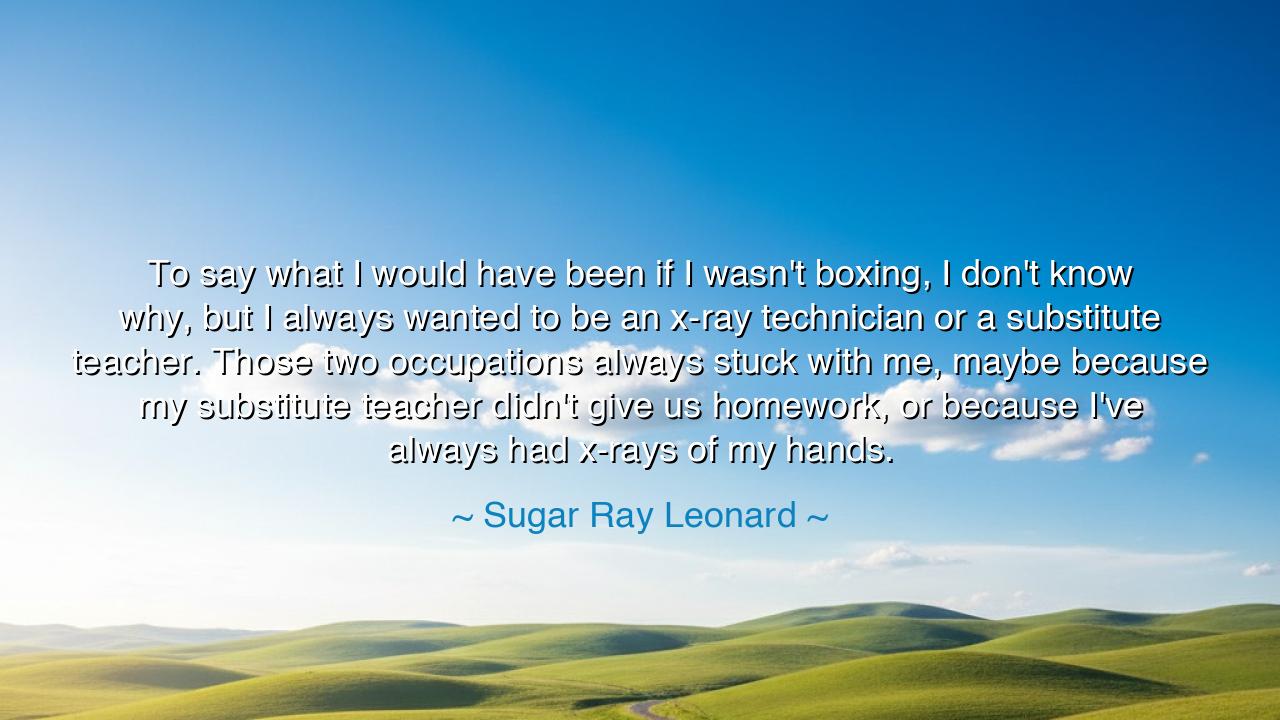
To say what I would have been if I wasn't boxing, I don't know
To say what I would have been if I wasn't boxing, I don't know why, but I always wanted to be an x-ray technician or a substitute teacher. Those two occupations always stuck with me, maybe because my substitute teacher didn't give us homework, or because I've always had x-rays of my hands.






Hear the words of Sugar Ray Leonard, champion of the ring, who once confessed with humility and humor: “To say what I would have been if I wasn’t boxing, I don’t know why, but I always wanted to be an x-ray technician or a substitute teacher. Those two occupations always stuck with me, maybe because my substitute teacher didn’t give us homework, or because I’ve always had x-rays of my hands.” At first glance, his words may seem lighthearted, even casual. But hidden within them is a profound meditation on destiny, on the humble paths we might have taken, and on the strange ways memory and experience shape our dreams.
The essence of this saying lies in the recognition that behind every life that seems destined for greatness lies a multitude of other possible lives. Leonard, who rose to glory in the world of boxing, could just as easily have lived a quieter life in service—tending the hidden bones of the body as an x-ray technician, or shaping young minds in classrooms as a substitute teacher. His reflection teaches us that greatness does not erase simplicity, nor does fame obliterate the gentler ambitions of youth. We are all multitudes, carrying within us many selves that might have been.
The mention of the x-ray technician is no accident. For the boxer, whose fists are both weapons and instruments, the x-ray became a constant companion. Leonard speaks of his own hands, examined again and again by machines that revealed what the eye could not see—the fractures, the hidden strains, the silent cost of glory. Perhaps in these moments of vulnerability he felt a quiet reverence for the healer who interprets shadows and light, who looks beneath the surface to see the truth. It is no wonder that this occupation lingered in his imagination: it is the counterpart to his own path, for where the fighter breaks, the technician repairs.
And the substitute teacher—here too lies wisdom. Leonard recalls fondly that his substitute teacher did not assign homework, a small kindness that left a deep impression on his youthful mind. But behind the humor lies something greater: the memory of mercy, of a figure who gave him ease in a world of demands. This, too, speaks to the shaping power of teachers, even those who may not be permanent fixtures. A single act of grace in childhood can echo for decades, reminding us that greatness is often inspired not by rigid authority, but by compassion.
History is rich with such examples of men who dreamed of simpler paths, even as destiny pulled them to glory. Abraham Lincoln once spoke of how he might have been content as a small-town lawyer, never imagining he would bear the weight of a nation’s soul. Winston Churchill, long before he became the symbol of wartime defiance, dreamed of painting in solitude. So too with Leonard: though the world remembers him as a warrior, he remembers himself also as one who might have healed, or one who might have taught. And in this remembrance we see the humility of a man who knows that worth is not measured only in titles, but in service.
The deeper lesson is that each life is a tapestry of choices, circumstances, and chance encounters. We are shaped not only by the battles we fight, but also by the small mercies and impressions left on us in youth. A teacher’s kindness, a doctor’s care, a moment of relief in a difficult season—all of these may plant seeds of longing that stay with us, even if we never walk those roads. Leonard reminds us that we should not dismiss these alternate selves, for they reveal what we value most deeply: healing, teaching, kindness, and care.
Practical wisdom follows: honor the many paths within you. Even if life draws you toward one destiny, remember the other dreams you once carried, for they reveal the softer truths of your nature. If you are a fighter, do not forget the healer within. If you are a leader, remember the teacher you once admired. Seek ways to weave those dreams into your life, even if not as full vocations—through acts of compassion, through sharing knowledge, through helping others heal.
Remember always: greatness is not only in the arenas of glory, but in the quiet vocations of service. Sugar Ray Leonard’s words remind us that even the most celebrated champion is still the child who admired a teacher and respected the unseen work of the x-ray technician. So too in our lives: let us honor not only what we have become, but what we might have been, for in those possibilities lies the fullness of the human soul.






AAdministratorAdministrator
Welcome, honored guests. Please leave a comment, we will respond soon